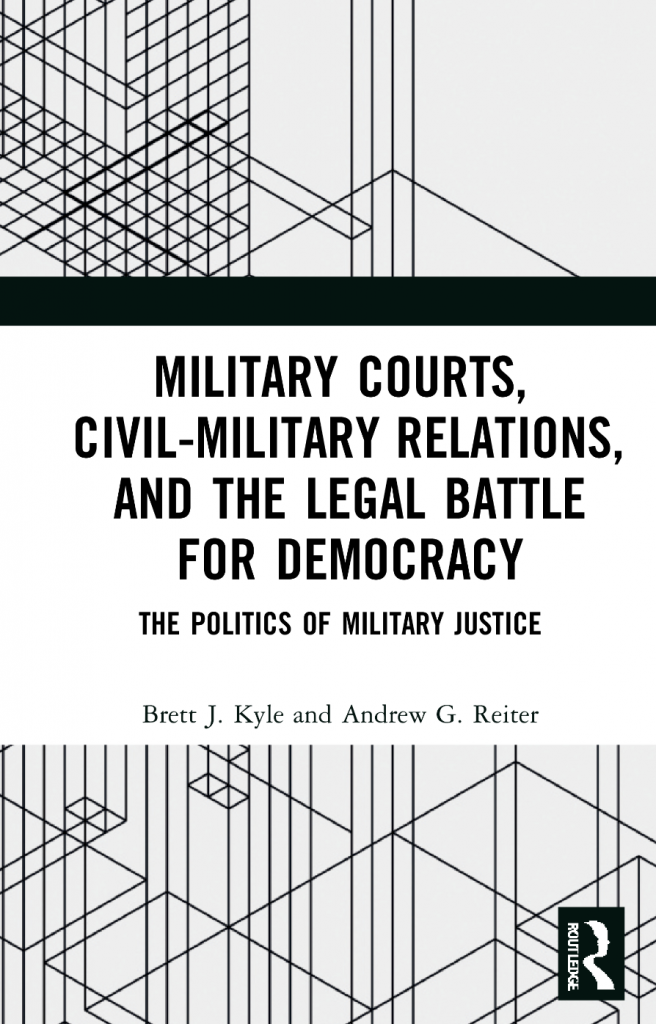Select a country in the search bar above to navigate nearly 1,000 laws, court cases, reports, and other primary documents related to military justice (including all that were cited in the book). To contribute documents, please email me
Military Courts, Civil-Military Relations, and the Legal Battle for Democracy: The Politics of Military Justice
Brett J. Kyle and Andrew G. Reiter
Routledge, 2021
**Named a Choice 2022 Outstanding Academic Title**
Description

The interaction between military and civilian courts, the political power that legal prerogatives can provide to the armed forces, and the difficult process civilian politicians face in reforming military justice remain glaringly under-examined, despite their implications for the quality and survival of democracy. This book breaks new ground by providing a
theoretically rich, global examination of the operation and reform of military courts in democratic countries. Drawing on a newly created dataset of 120 countries over more than two centuries, it presents the first comprehensive picture of the evolution of military justice across states and over time. Combined with qualitative historical case studies of Colombia, Portugal, Indonesia, Fiji, Brazil, Pakistan, and the United States, the book presents a new framework for understanding how civilian actors are able to gain or lose legal control of the armed forces. The book’s findings have important lessons for scholars and policymakers working in the fields of democracy, civil-military relations, human rights, and the rule of law.
Reviews
Human Rights Quarterly
Perspectives on Politics
Global Military Justice Reform
Política y Gobierno (Critical Dialogue)
Journal of Peace Research (Book Note)
Endorsements
“This pathbreaking book has much to offer legal scholars, political scientists, and the informed public alike. Kyle and Reiter built an extremely valuable data-set that allowed them to carefully but authoritatively explain the reasons behind the different evolutionary paths of military justice in a number of well-chosen case studies grounded in meticulous historical research and benefiting from novel theoretical insights. In short, this is a volume of excellent, innovative, and eminently readable scholarship.”
Zoltan Barany, University of Texas, USA
“Military Courts, Civil-Military Relations, and the Legal Battle for Democracy: The Politics of Military Justice fills a void left by legal and civil-military scholars alike, introducing us to the important political role military courts play in democracies. This exhaustive study that draws on an original large-N dataset along with three, in-depth, paired country comparisons, develops an innovative framework that categorizes military tribunal powers into ones of military overreach, jurisdictional contestation and full subordination. It offers an explanatory model that accounts for why some nations push forward with court reforms while others slide backwards, with implications for the rule of law, human rights, and democratic advances. This is a superb study that should become required reading for all those fascinated by civil-military interactions.”
David Pion-Berlin, University of California, Riverside, USA
“Brett Kyle and Andrew Reiter have delivered a painstakingly constructed dataset of military justice in 120 countries worldwide, whilst simultaneously drilling deep with comparative historical analysis into seven fascinating case studies to illustrate and explain causation over time. The result is a powerful contribution to longstanding yet understudied issues concerning military-civilian relations. This volume provides a sound framework for understanding different causal pathways of change in military court systems. The book will be of great interest to policymakers, political scientists and legal scholars, and law and society scholars more generally.”
Tamir Moustafa, Simon Fraser University, Canada
This book addresses a crucial, yet often forgotten topic for democratic regimes: the inherent tension between the need to build efficacious armed forces bounded to the rule of law. Brett Kyle and Andrew Reiter remind us of the importance of military justice for democracy, emphasizing the political dynamics behind whether military justice is subordinated to civilian laws, military justice overreaches to include civilians, or civilian and military justice clash over jurisdiction. Based on an original database on military justice systems covering 120 countries, and on seven interesting and thorough case studies, the book explores how military justice systems were established, how and why they evolved, and their relationship to democracy and the rule of law. In a period where more and more democracies are calling upon the armed forces to face internal security and political crises, Kyle and Reiter’s important book offers more than an insightful academic exercise. It provides a template for consolidating a military justice system consistent with democracy and preventing backsliding.
Julio Ríos-Figueroa, CIDE, Mexico
Table of Contents
- Chapter 1. Why Military Justice Matters
- Chapter 2. The Role of Military Justice in the Modern World
- Chapter 3. Judges, Generals, and Politicians: The Fight Over Military Justice
- Chapter 4. Full Subordination in Portugal and Colombia: Playing by Civilian Rules
- Chapter 5. Jurisdictional Contestation in Indonesia and Fiji: Competing for Control of Military Justice
- Chapter 6. Military Overreach in Brazil and Pakistan: When the Generals Become the Judges
- Chapter 7. From Full Subordination to Military Overreach and Back Again: Military Justice in the United States
- Chapter 8. Conclusion
- Appendix. Military Legal Subordination in the Modern World